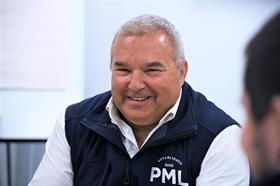
Gridlocked roads, serious border delays and increased import costs continue to hit the headlines, and according to PML’s managing director Mike Parr, the worst is yet to come.
At the Port of Dover alone, Parr said that miles of queuing HGV traffic on the approach to the port has become the norm since the beginning of the year because of the new customs paperwork for goods being exported out of, or imported into, the UK.
Parr warns that the situation is only destined to further deteriorate, as currently, ports from the EU can only be processed using the Goods Vehicle Movement System (GVMS). From 1 July, physical inspections at a Border Inspection Post will be introduced for all inbound products from the EU (such as live animals, meat products and high-risk non-animal foods), putting further pressure on what is already a stretched resource.
“There's a lot worse to come,” Parr said. “We warned there would be delays, which there have been, but I'm dreading the point at which EU products start to be examined, because right now there are already insufficient staff available.
“How are inspectors going to cope with the extra workload associated with examining every single meat, fish, dairy product from the EU on top of their existing responsibilities?”
Parr believes that the planned current infrastructure and staffing to support Dover and Folkestone is inadequate and will be unable to successfully process the extensive volume of traffic.
“The existing Inland Border Facilities are not capable of handling the vast number of checks that are going to be required from July, yet when we applied for our Kent transport and logistics hub to be considered to alleviate the strain, our submission was rejected,” he said.
“Private companies need to be allowed to operate in this sector if we are to prevent further disruption. Our government’s handling of imports and exports post Brexit has been shambolic. There is a real sense within the industry that they really don’t understand the business and the consequences of their decisions.”
Parr continued: “We should look at Holland who have a system in place whereby customs and port health are given a certain amount of time to come and examine the vehicle and if it is not completed within the allocated time frame, it is classed as cleared and the driver is free to continue his or her journey. Perhaps our government could contemplate a similar system or, failing that, train a lot more staff.
“Unfortunately, at this point, with 1 July looming, regardless of what approach is taken, we just don’t have time on our side. If anyone thinks the queues are bad now, wait until the checks come into force as it will be ten times worse.”
Since 1 January, lorries have been required to use the GVMS to move through customs with any customs documentation that needs to be completed before the vehicle boards the ferry. This contrasts with the pre-Brexit system which allowed for any accompanying paperwork to be submitted up to two months afterwards.
The situation was exacerbated by the crashing of the new GVMS system on 1 January, the first day of its use, following the introduction of new entry requirements.
Parr reports that teething problems have included drivers being denied permission to make a trip when reference codes were rejected by the system, and firms experiencing difficulties in uploading the necessary information. This has “done little to inspire confidence within the industry,” he said.
According to Parr, the government is “simply not up to speed” with the number of officers that are available to carry out inspections and this is “causing a major problem at the ports”.
For instance, Parr revealed that a recent PML consignment of fresh raspberries, which arrived at the port at 3pm, was not inspected until 10am the next morning.
“The fallout from this is clear,” he said. “Perishable goods, which are heavily marketed as ‘fresh’, being exposed to a delay of almost 20 hours is totally unacceptable and will naturally impact on relations with the retailer.
“The lorry being held at the port for such a long time contributes to the build-up of traffic, but also causes the driver unnecessary stress and the inability to take the appropriate rest break as he or she is expected to sit it out and wait for the product to be examined. Of course, ultimately it is the haulier who bears the brunt of the problem resulting in significant financial losses.
“Urgent action is required to enable those involved in the food supply chain to deliver a seamless, timely service to maintain the supply of essential products.”



